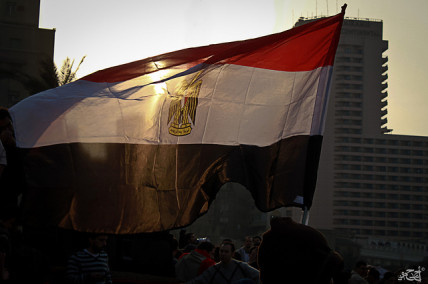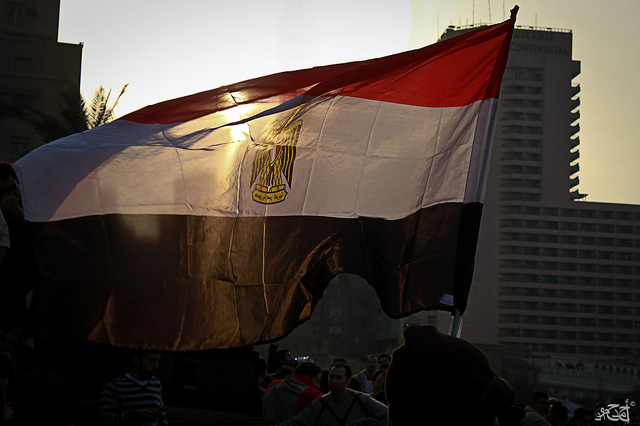
Photograph by Ahmad Hammoud
The Muslim Brotherhood and President Morsi made many political mistakes during their reign; yet, the Egyptian Military’s present campaign will not reverse these errors but rather exacerbate an already grave situation.
As the Obama administration struggles to formulate a coherent policy on Syria, the political and security situations in Egypt continue to deteriorate, pushing the most important Arab country toward a possible civil war. While the crisis in Syria is critical and presents a “threat to global peace”, the worsening security conditions in Egypt will have much more impact on American, Israeli and European interests in the Middle East and North Africa.
As the debate in Washington centers over the future of US aid to Cairo and the prospects of troubles in the relations between the two nations, the Egyptian Army continues a ruthless military campaign against armed groups in the lawless Sinai Peninsula and a brutal police operation to arrest sympathizers of the ousted president Mohammed Morsi across the country.
Egypt’s new strong man, General Abdel Fattah El Sisi, has accused Muslim Brotherhood (MB) supporters of inciting violence and plotting to destabilize the country, allegations denied by the opposition. The military’s heavy-handed crackdown has led to the arrest of most of the MB senior leadership.
The politically motivated arrests and harassment of MB activists are counterproductive and will eventually backfire. If security forces have the upper hand in Cairo and Alexandria, the Egyptian Army is struggling to contain opposition groups in their strongholds throughout Upper Egypt. In provinces like Dalga and Minya, known hubs for armed Islamist insurgency dating back to the violent days of 1990s, El Sisi’s mass arrests of Islamists is strengthening the hands of more extreme elements especially Jama’a Al Islamiya.
To grasp the magnitude and impact of a “security chaos” in Egypt on world peace, American officials need to revisit the history of the terror group al-Qaeda with special emphasis on the Egyptian connection to the birth and expansion of contemporary international terrorism.
The rise of the Al-Qaeda terror group can be traced to the persecution, imprisonment and political killings of Egyptian Islamist leaders during the 1960s, 70’s and 80’s. This fresh wave of brutal crackdown on Muslim Brotherhood sympathizers along with other more extreme elements of the Egyptian Islamist movements may result in the emergence of new ‘Al-Qaeda-type groups’. If Americans and Europeans continue to ignore the ongoing violence in Egypt, the world may suffer more consequences similar to the attacks of 9/11 New York and 7/11 in London.
The name Al-Qaeda first appeared in the Egyptian press during the dark periods of the 1980’s and 1990’s when Egyptian security forces were trying to stem Egyptian Islamic Jihad (EIJ) terror assaults on high ranking Egyptian politicians and foreign tourists; long before the September 11 attack in the United States. Al Qaeda leader Ayman al–Zawahiri is a former EIJ member.
While there is a little doubt about the primary impact of EIJ on the creation of Al-Qaeda, little is understood about the long term implications of the Nasser-Sadat crackdown on Islamist militants, including the Muslim Brotherhood (MB), on the emergence of Islamist extremist groups worldwide.
During the 1952 revolution Islamist militants helped the military overthrow of King Farouk, and MB activists have played a leading role in the 2011 revolt that led to the demise of President Mubarak’s regime. In the aftermath of both these momentous events in the history of contemporary Egypt, the fate of Islamist groups was similarly bloody. Political Islamist organizations were persecuted by the military, leading to the jailing and death of activists and the militarization of the extreme elements of these groups.
The radicalization of the spiritual leader of today’s Islamist extremists materialized in the jails of Nasser. Sayyed Qutb, whose manuscripts and jihadi philosophy are the ideological pillars of groups like Al-Qaeda, wrote his most fervent manuscript, titled Milestone, while in custody awaiting hanging at the hand of the Egyptian military. Qutb’s penchant for violence targeting government organizations and institutions came as a result of his own persecution and as a consequence of the assassination of Hassan Al-Banna, the founding father of MB.
General El Sisi is reenacting the same scenario but this time under the watch of an ambivalent American government. While some American observers argue that Gen. Sisi’s military and political campaigns against “a coalition of Muslim Brotherhood and radical Muslims” is an internal affair, others view such overuse of force as a prelude to a resurgence of political violence that will eventually threaten America and Europe.
The similarities between the two periods are striking. Adopting Nasser’s approach – and that of Sadat and later Mubarak – Gen. El Sisi is using harsh and disproportioned measures to suppress MB activities. The recent trials and sentencing of MB sympathizers in military courts under a ‘state-of-emergency’ is akin to the trials of MB supporters in Egypt of the 60’s and 80’s. As such the results could be similar, with the same disastrous consequences.
In fact the September 5 assassination attempt in Cairo against the Egyptian Interior Minister is a vivid reminder to the Egyptian military and American officials that Gen. Abdel Fattah El Sisi’s authoritarian political decisions and harsh security measures are creating a ripe climate for the birth of a new, more lethal EIJ.
The September 5 attack was claimed by the jihadist Ansar Bait al Maqdis (ABM) group. Some Egyptian observers have tried to link the MB to the ABM to discredit Morsi supporters. However, all the indications are that it is new functional cells with sophisticated terrorist capabilities that have emerged in Upper Egypt. These developments will threaten peace in the Middle East.
The US administration’s serious indecisiveness and jumbled response to tackling the fast moving events in Egypt since the removal of President Mubarak is undermining American importance in the region and diminishing Washington leverage over the Egyptian regime of Gen. El Sisi.
Washington and Brussels must engage all parties in Egypt to bring about a resolution to the current crisis. The United States, Europe and indeed the world need a unified, strong and democratic Egypt to keep peace in a strategic region. MB and President Morsi made many political mistakes during their reign; yet, the Egyptian Military’s present campaign will not reverse these errors but rather exacerbate an already grave situation.
Written by Hassan Masiky
Hassan Masiky is a freelance journalist and former advisor to Amnesty International USA.




